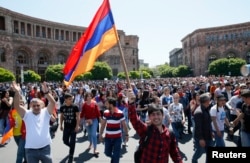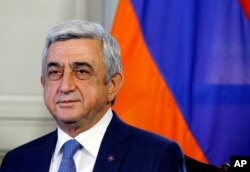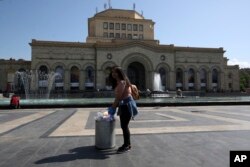The Armenian ruling party's signal of support for opposition leader Nikol Pashinyan's bid to become interim prime minister has been greeted with disbelief by some on the streets of the capital.
Opposition supporters lingered in Yerevan's Republic Square even after Pashinyan called to halt demonstrations as all sides negotiated a solution to the political crisis that has wracked the tiny South Caucasian country for weeks.
On Thursday, Armen Ashotyan, deputy head of the ruling Republican Party, told reporters that his legislators would support Pashinyan in an upcoming May 8 parliamentary vote to elect a prime minister, as long as the opposition figure won at least a third of the votes cast.
"We had two criteria to assist any candidate," Ashotyan said. "The first is a necessary ... amount of signatures, and the second is to calm down the situation on the streets, not blocking the interstate roads, airports, etcetera. So, the man who could cope with this criteria is considered to be Nikol Pashinyan and in case — before 8 May — he keeps these two criteria as promised, as agreed, we will assist his election."
The statement comes just two days after Armenia's parliament voted 45-to-55 against Pashinyan, leaving him eight votes short of the majority needed to capture the former Soviet republic's most powerful office.
"If that is true, we are very glad, but I can't believe that's possible," said a young Armenian woman who, like thousands of others, had participated in weeks of protests that forced the resignation of former Prime Minister Serzh Sargsyan.
Sargsyan, who was elected prime minister by parliament on April 17 — some eight days after his two-term presidency ended — had previously said he would not seek to become prime minister after newly implemented constitutional changes, which he championed during his presidency, made the office of prime minister more powerful than that of the president.
Republicans' Tuesday abstentions, which blocked Pashinyan's bid to become prime minister, leaving the office vacant, triggered city-wide street blockades and strikes.
On a bench in Republic Square, one protester suggested Ashotyan's Thursday assurances of a plan to back Pashinyan seemed too good to be true.
"We can't believe until we see it," he said.
"We hope Nikol Pashinyan will be our premier," said the women seated beside him. "And by 'our,' I mean all of us."
If the May 8 vote fails to elect a prime minister, parliament will be dissolved and fresh elections will be called.
Optimistic opposition
Although recants protests have been largely non-violent, some Pashinyan loyalists say the country appears to be on the verge of forcing a change of government.
Gevorg Gorgisyan, a parliamentarian aligned with Pashinyan's Yelk or "Way Out"-alliance, which holds 47 votes among its loosely allied opposition constituency, described the majority Republican as out of touch with most Armenians.
"[Republican leadership] speeches enraged our citizens, as they merely admitted minor mistakes and attempted to stay in power," he said, referring to widespread frustration over poverty, corruption and poor governance in the nation of some 3 million people.
According to statistics by the United Nations, more than 11 percent of Armenians live below the poverty line, earning less than 1,530 Armenian drams ($3.20) per day, and, as Bloomberg reports, emigre remittances from Armenia's 8-million-strong diaspora comprise 14 percent of national GDP.
Under Sargsyan, Armenia barely recovered from a GDP decline of 14 percent in 2009, only to witness a 7.5-percent surge of economic growth in 2017.
By the end of last year, however, the economy faced deflation and extremely weak domestic demand.
"They just don't realize that it's too late," Gorgisyan added. "That train has already left the station."
Fellow Yelk Alliance MP Edmon Marukhyan expressed confidence in a May 8 triumph for Pashinyan, who has vowed to rid Armenia of corruption, poverty and nepotism, and has promised snap elections.
"We will need to adapt the electoral code to guarantee that no administrative resource can be used during the elections and to prevent any bribe of the voters," he said, seeming to look well beyond the upcoming parliamentary vote. "Only the people's candidate can guarantee that, and today that person is Nikol Pashinyan."
Gagik Tsarukyan, leader of the slightly larger opposition Prosperous Armenia, told VOA's Armenian Service that although his party has been odds with their fellow Yelk Alliance legislators, they plan to back Pashinyan unconditionally.
"Today the victory belongs entirely to the people, and the people should decide who their candidate [for prime minister] is," he said. "As for us, we will vote for that candidate as we did last time."
In the United States, members of the vast Armenian diaspora community have given full-throated support for Pashinyan's candidacy, holding demonstrations in front of the Armenian embassy in Washington on the streets of Los Angeles, which is home to Armenia's largest diaspora community.
"The people have said 'enough!'" said Gurgen Mkhitaryan, a member of the Los Angeles branch of Armenian Renaissance, a diaspora-led grass-roots organization composed of international and municipal chapters that aims to bring about true representative government and rule of law in Armenia.
"We should have said it long ago, but we managed to do it today," he added, expressing skepticism about calls to slow the Armenian opposition's pursuit of radical change.
"Questions about why now, why not a year ago, why not wait until 2022 — they don't make sense," he said. "Armenia belongs to the people."
This story originated in VOA's Armenian Service. Arman Tarjimanyan reported from Washington. Angelina Bagdasaryan of VOA's Russian Service contributed original reporting from Los Angeles.








